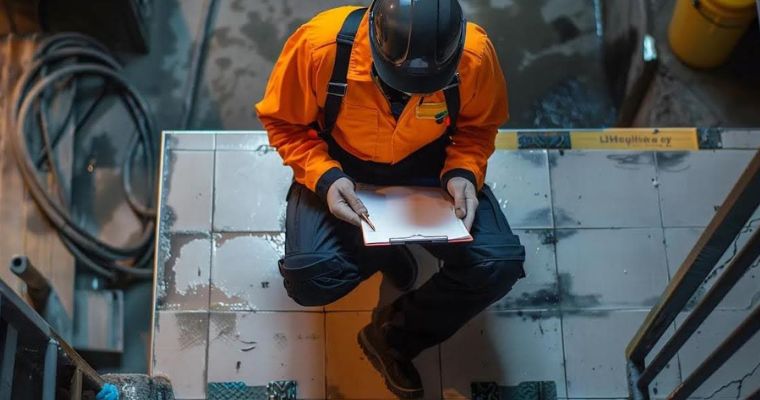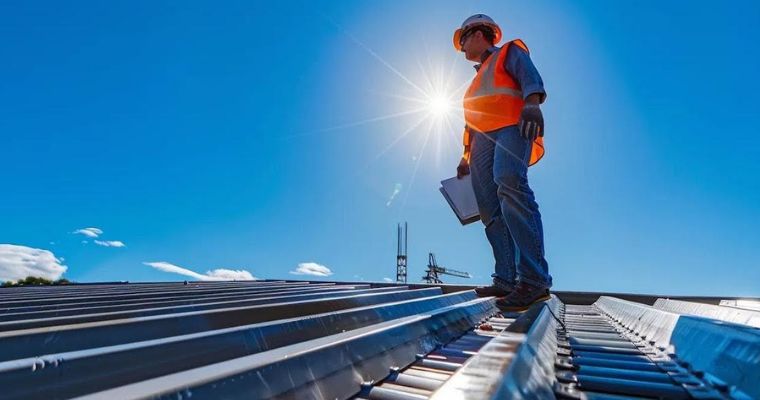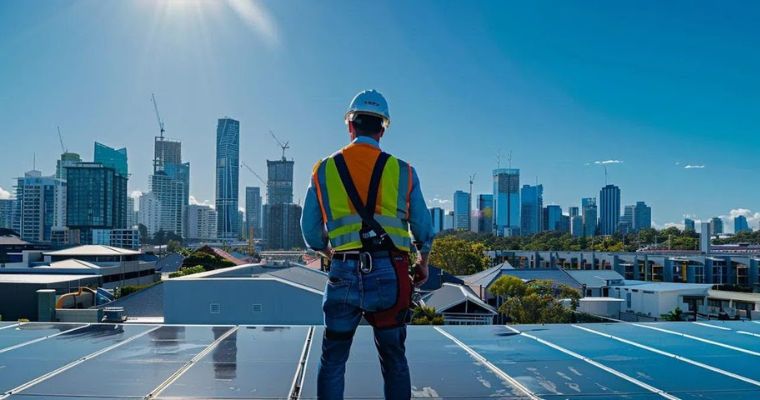Get free quotes within minutes
Roofing Contractor Brisbane: Expert Services, Costs, and Local Solutions

Table Of Contents
- Introduction
- What Roofing Services Does a Brisbane Contractor Offer?
- How Much Does Roofing Cost in Brisbane?
- Which Roofing Materials Are Best Suited for Brisbane’s Climate?
- How Does Brisbane Apex Roofing Ensure Quality and Reliability?
- What Are the Steps in the Roof Installation and Replacement Process?
- How Often Should You Schedule Roof Inspections in Brisbane?
- Where Does Brisbane Apex Roofing Provide Services, and What Local Factors Affect Roofing?
- Final Thoughts
Roofing Contractor Brisbane: Expert Services, Costs, and Local Solutions
Roofing is a critical component in protecting investments, ensuring safety, and enhancing the curb appeal of homes and businesses in Brisbane. With ever-changing weather, heavy rain and intense sun, maintaining a structurally sound and aesthetically pleasing roof is vital. This article details the roofing services offered by a Brisbane contractor—if you need additional information, please contact a roofing contractor in Brisbane. explains the associated costs, discusses sustainable and durable materials suited for Brisbane’s climate, and highlights the expertise of Brisbane Apex Roofing. By understanding the process from installation to inspection and repair, property owners can make informed decisions to safeguard their investments. The following content outlines common services, cost factors, material choices, quality control measures, process steps, inspection frequency, and local influences on roofing projects in Brisbane.
What Roofing Services Does a Brisbane Contractor Offer?
Brisbane roofing contractors offer an array of services to enhance both protection and aesthetics. These include roof repair, installation, replacement, guttering, and inspections. Each service is customised to meet the needs of residential and commercial clients in an area known for its challenging weather and strict building codes.
What Is Included in Roof Installation Services in Brisbane?
Roof installation begins with assessing structural integrity and evaluating the building’s framework. Contractors then recommend suitable materials—metal, tiles, or shingles—that are best for Brisbane’s climate. Installation involves meticulous sealing, safe handling of heavy materials, and adherence to building regulations. A correctly installed roof improves energy efficiency, increases property value, and integrates ventilation and insulation to help prevent issues like water damage and heat buildup.
How Do Roof Repair Services Address Common Issues?
Roof repair services target a range of common issues such as leaks, broken tiles, rust, gutter blockages, and storm damage. The process starts with a detailed inspection to diagnose the problem. Repairs may involve replacing damaged shingles, resealing joints, or making minor structural adjustments. Modern repair methods combine traditional craftsmanship with new technology, ensuring sustainable and long-lasting fixes while preventing further water damage and reducing future investment risks.
When Is Roof Replacement Necessary and What Does It Involve?
When damage becomes extensive or the roof exceeds its useful life, roof replacement is recommended. Signs include recurring leaks, curling tiles, and persistent water damage. Replacement involves removing the old roofing, addressing any structural issues, and installing a new roof that meets current building standards. Although more expensive than repairs, replacement enhances energy efficiency, improves curb appeal, and ensures safety for the long term.
What Guttering Services Are Available From Brisbane Roofers?
Guttering is crucial for managing stormwater and protecting building foundations. Brisbane roofers install, replace, or repair gutters made from durable, corrosion-resistant materials like aluminium or Colorbond steel. Modern systems are designed to efficiently channel heavy rainfall, preventing water back-up that could lead to basement flooding or peripheral damage. Regular gutter cleaning and the addition of gutter guards help maintain optimal performance and prolong the gutter system’s lifespan.
Why Are Roof Inspections Important for Brisbane Homes and Businesses?
Regular roof inspections help detect issues before they escalate into major repairs or complete failure. In Brisbane’s climate, where wear and tear occur rapidly, inspections assess material condition, identify signs of water damage, and review structural integrity, along with gutter and insulation functionality. Early detection can prevent costly repairs, mitigate potential liability insurance claims, and ensure compliance with local building regulations for both residential and commercial properties.
How Much Does Roofing Cost in Brisbane?
Roofing costs in Brisbane vary depending on material choice, roof size, labour, and project complexity. A detailed cost assessment includes materials, installation or repair labour, old roofing disposal, and permits if needed. Transparent free quotations provided after an inspection allow property owners to accurately budget for roofing projects and avoid unexpected expenses.

What Factors Influence Roof Installation Costs in Brisbane?
Key factors affecting installation costs include the type of roofing material, roof pitch, and overall roof area. The design complexity—such as skylights or chimneys—and customisation needs also play a role. Labour costs vary with contractor expertise and the project's intricacy. Additional elements like energy efficiency and extra insulation can modify the final price. Accurate site measurements and assessments help ensure that quotes match the exact work required.
How Are Roof Repair Prices Determined?
Roof repair pricing depends on the damage’s extent, the materials used originally, and the specific repair techniques needed. Minor repairs, such as sealing gaps or replacing a few tiles, cost significantly less than extensive fixes for widespread water damage. Labour charges and emergency service fees may also apply. Detailed quotations break down every cost component, enabling property owners to clearly understand the work required, while timely repairs help reduce overall expenses.
What Is the Typical Cost Range for Roof Replacement?
The cost range for roof replacement depends on roof size, chosen materials, and design complexity. Premium installations using high-quality tiles or metal can be several thousand dollars, whereas simpler replacements may be less expensive. If structural repairs are required, the total cost will be higher. It is advisable to obtain multiple quotes and verify contractor credentials to ensure competitive pricing and quality workmanship.
Are There Affordable Roofing Options in Brisbane?
Affordable roofing options are available for homeowners seeking to balance quality with cost efficiency. Many contractors offer a variety of materials suitable for different budgets. While premium tiles or metal roofs may have higher upfront costs, economical options like standard asphalt shingles or cost-effective metal alternatives provide good durability. Financing options and free quotes are often available, and regular maintenance can prevent unexpected future costs, promoting long-term affordability.
Which Roofing Materials Are Best Suited for Brisbane’s Climate?
Brisbane’s subtropical climate requires roofing materials that are durable, energy-efficient, and resistant to moisture and high temperatures. The choice of material affects the roof’s longevity, appearance, and performance. Contractors consider heat reflectivity, wind resistance, and heavy rain protection when making recommendations. Sustainable choices and locally available materials further enhance resilience against Brisbane’s specific weather conditions.
What Are the Pros and Cons of Tiled Roofing in Brisbane?
Tiled roofing is popular in Brisbane due to its timeless look and robust durability. Advantages include longevity and heat reflection, which improves energy efficiency during warm months. Tiles also provide strong protection against wind and water ingress. However, they require a sturdy understructure and can be more expensive to install and repair. Improper maintenance may lead to cracked or displaced tiles, causing leaks. When installed by experienced professionals, tiled roofs remain a reliable and attractive option.
How Does Metal Roofing Perform in Brisbane’s Weather?
Metal roofing is highly suitable for Brisbane’s weather because it is lightweight, strong, and resistant to severe weather conditions. It reflects solar radiation, reducing interior cooling loads and enhancing energy efficiency. While the upfront cost can be higher, the long-term benefits through lower maintenance and energy savings often justify the investment. Metal roofs are versatile in style and colour, resistant to corrosion, and perform well despite rapid temperature changes.
Are Shingles a Good Choice for Brisbane Homes?
Asphalt shingles, a traditional roofing choice, are favoured for their affordability and ease of installation. They perform well under normal weather conditions, though they may not be as durable in extreme weather compared to metal or tile. Extended exposure to UV rays and heavy rainfall can shorten their lifespan. Proper installation and regular inspections are essential to ensure that shingles remain a cost-effective roofing solution, but homeowners may opt for stronger materials for longer-lasting performance.
What Sustainable Roofing Materials Are Available Locally?
Sustainable roofing options are gaining popularity as environmental and energy efficiency concerns rise. In Brisbane, these include recycled metal roofing, clay tiles made with local materials, and green roofs that incorporate vegetation. Recycled metal roofing minimises environmental impact while offering durability. Clay tiles provide a classic look along with natural thermal benefits, and green roofs support urban biodiversity and efficient rainwater management. Incentives from local councils often make these eco-friendly alternatives more attractive for homeowners concerned with sustainability.
How Does Brisbane Apex Roofing Ensure Quality and Reliability?
Brisbane Apex Roofing is known for its commitment to quality and reliability. They strictly adhere to industry standards and use certified materials from trusted suppliers. Their team of experienced tradespeople is well-versed in Brisbane’s unique building codes and environmental conditions. A systematic inspection process and transparent communications ensure projects meet deadlines and achieve high standards, reinforcing the company’s reputation for excellence.

What Certifications and Expertise Does Brisbane Apex Roofing Have?
The company places a strong emphasis on professional certifications and continuous training. All contractors are fully licensed and insured, meeting statutory roofing requirements. Certifications from bodies like the Master Roofing Contractors Association give additional assurance of quality workmanship and safety. The leadership’s decades of experience in residential and commercial roofing, coupled with regular training updates, ensure that projects are completed efficiently and safely.
How Does Brisbane Apex Roofing Manage Project Timelines and Budgets?
Efficient project management is a hallmark of Brisbane Apex Roofing. Their project managers use advanced scheduling tools to set realistic timelines and coordinate logistics, ensuring completion within agreed timeframes. Detailed cost assessments and transparent quotations help clients manage investments effectively while avoiding unexpected expenses. Open communication throughout the project minimises delays and keeps the work on schedule and budget.
What Customer Support and Communication Can Clients Expect?
Customers benefit from a transparent and responsive support framework. From the initial consultation through final inspections, clients receive regular updates and maintain open channels for feedback. On-site supervision, detailed reporting, and post-project follow-ups ensure complete satisfaction. This customer-centric approach, backed by excellent reviews, fosters trust and repeat business in Brisbane’s competitive roofing market.
How Does Local Knowledge of Brisbane Building Codes Benefit Customers?
Hiring a local contractor like Brisbane Apex Roofing provides significant benefits. Their deep understanding of Brisbane’s building codes, zoning regulations, and environmental factors ensures that every project is compliant with current standards, reducing legal risks and avoiding costly modifications. This local expertise also translates into faster project turnaround, fewer compliance issues, and greater peace of mind for homeowners and businesses alike.
What Are the Steps in the Roof Installation and Replacement Process?
The roof installation and replacement process follows a systematic approach designed to maximise safety and performance. It begins with a thorough assessment, followed by careful design and planning, material procurement, and then the installation or removal of the old roof. Each step is critical to ensuring that all safety protocols are met and that the roof lasts as long as possible.
How Is a Roof Installation Planned and Executed?
Roof installation is meticulously planned, starting with a structural assessment to detect any underlying issues. Contractors then work with architects or engineers to create a design that fulfils aesthetic and functional requirements. Once the plan is set, appropriate materials are selected based on durability, climate suitability, and budget. The old roofing, if present, is safely removed before new materials are precisely installed. Throughout, stringent quality control measures help prevent leaks and ensure proper ventilation.
What Should Customers Expect During Roof Replacement?
During a roof replacement, customers can expect a well-organised process. Initially, the existing roof is removed while any structural concerns are addressed. New underlayment is installed, followed by careful placement of the chosen roofing material. Communication about timelines and potential disruptions is maintained throughout. The process concludes with debris removal and a final quality check, assuring customers that the new roof meets high standards.
How Are Roofing Materials Selected for Each Project?
Material selection is a critical step that affects both performance and cost. During consultations, contractors assess the building’s structure, design requirements, and budget to recommend the best materials. In Brisbane, materials with excellent heat reflectivity and water resistance are prioritised. Common choices include metal, tile, and sustainably sourced shingles, often used in tandem with protective underlayments. Ongoing consultation ensures that the chosen materials meet client expectations and long-term investment goals.
What Safety Measures Are Taken During Roofing Projects?
Safety is paramount in every roofing project. Contractors conduct a comprehensive risk assessment before work begins and ensure that all workers wear appropriate personal protective equipment, such as helmets and harnesses. Scaffolding and fall-arrest systems are securely installed, with frequent onsite safety inspections to prevent accidents and reduce liability risks.
How Often Should You Schedule Roof Inspections in Brisbane?
Regular inspections keep the roof in optimal condition. Experts recommend at least one annual inspection, plus additional checks after severe storms. These evaluations identify minor issues such as loose shingles or clogged gutters before they become expensive problems. Proactive inspections also help maintain insulation and overall energy efficiency, reducing the risk of sudden water damage or structural compromise.

What Are the Key Elements of a Roof Inspection Checklist?
A basic roof inspection checklist includes an evaluation of the roofing materials for cracks, displacements, and signs of wear or corrosion. Inspectors ensure that vents, skylights, and chimneys are properly sealed, the gutter system is functioning, and that there is no moss or algae growth. They also examine insulation and ventilation to confirm energy efficiency. Early detection through this checklist allows for timely repairs and cost savings.
How Can Early Roof Inspections Prevent Costly Repairs?
By identifying small leaks, deteriorating shingles, or clogged gutters early, roof inspections allow for timely interventions that prevent larger issues. This proactive approach mitigates the risk of extensive water damage or structural decay, thereby reducing repair costs and preserving energy efficiency over the long term.
When Is Emergency Roof Inspection Needed?
Emergency inspections are necessary when severe weather, falling debris, or sudden accidents cause visible damage such as significant leaks or structural sagging. Immediate inspection in these situations can prevent further deterioration and ensure resident safety, determining whether emergency repairs or a complete replacement are required.
What Are Common Roof Inspection FAQs?
Frequently asked questions include how often inspections should occur, the typical duration, and the qualifications of inspectors. Homeowners often ask about the signs that indicate the need for repairs, inspection costs, and whether they should be present. Roofing experts stress that routine inspections are vital for maintaining roof performance and preventing costly repairs.
Where Does Brisbane Apex Roofing Provide Services, and What Local Factors Affect Roofing?
Brisbane Apex Roofing serves numerous suburbs within and around Brisbane, leveraging deep local expertise in regional building codes, weather patterns, and infrastructural demands. Factors such as high humidity, intense UV exposure, and occasional severe thunderstorms influence material and design choices. This localised knowledge allows Brisbane Apex Roofing to tailor each project to both urban and suburban environments while ensuring compliance with strict building regulations.
Which Brisbane Suburbs Are Serviced by Brisbane Apex Roofing?
Their service area covers many well-known suburbs, including the Brisbane CBD, South Brisbane, Fortitude Valley, Indooroopilly, and Chermside. This extensive coverage ensures high-quality roofing solutions are accessible across various residential and commercial areas, with tailored solutions that respect local architectural styles and climate challenges.
How Do Brisbane’s Building Codes Impact Roofing Projects?
Brisbane’s building codes set the minimum standards for materials, installation methods, and safety measures, including wind load, fire safety, and energy efficiency. Contractors like Brisbane Apex Roofing stay updated with evolving regulations, ensuring all projects meet these stringent criteria, thereby minimising risk and ensuring durability.
What Climate Challenges Affect Roofing in Brisbane?
Brisbane’s climate—with heavy rainfall, high humidity, and intense UV rays—accelerates material wear. Prolonged sun exposure can fade colours and weaken adhesives, while moisture may cause mould and corrosion. Roofing solutions in the area are designed to withstand these conditions by prioritising materials that resist water damage, UV degradation, and physical impact.
How Does Local Expertise Improve Roofing Outcomes?
Local expertise means a deeper understanding of environmental conditions and building practices. Contractors in Brisbane, such as Brisbane Apex Roofing, can provide more accurate cost estimates, select materials best suited to the local climate, and complete installations more efficiently. This results in improved quality, reduced maintenance costs, and a longer-lasting roof.
Final Thoughts
Brisbane roofing services are essential investments in the safety and longevity of any property, residential or commercial. Understanding the scope of services from installation and repair to replacement and inspection enables customers to make informed decisions that suit their specific needs. Emphasising quality materials, local expertise, and proactive maintenance ensures roofing projects not only meet regulatory standards but also withstand Brisbane’s unique climatic challenges. With clear cost structures and reliable workmanship, property owners can protect their investments while enhancing the overall value and appearance of their buildings.
Answers to Your Common Questions
YOU MIGHT ALSO BE INTERESTED IN

Roofing Contractor Brisbane: Expert Services, Costs, and Local Solutions
Capital Cities
- Roofing Contractors Services in Melbourne
- Roofing Contractors Services in Brisbane
- Roofing Contractors Services in Sydney
- Roofing Contractors Services in Adelaide
- Roofing Contractors Services in Perth
- Roofing Contractors Services in Canberra
- Roofing Contractors Services in Hobart
- Roofing Contractors Services in Darwin









